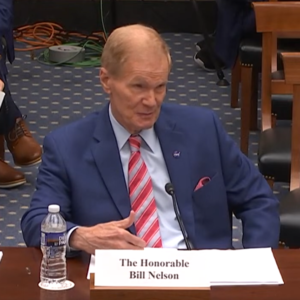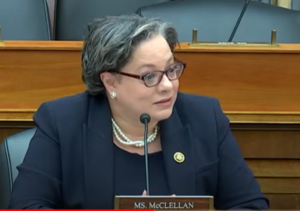Nelson Pleads With Congress to Fund ISS Deorbit Vehicle
NASA Administrator Bill Nelson pleaded with members of the House Science, Space, and Technology Committee today to pass a pending domestic supplemental appropriations bill that includes money to build a deorbit vehicle for the International Space Station. The supplemental also includes money to repair antennas in Guam damaged by a hurricane last year. He argued this is emergency funding that should be considered separately from NASA’s regular budget request and also revealed that the estimated cost of the deorbit vehicle has grown to $1.5 billion over six years.

Nelson was testifying before House SS&T on NASA’s FY2025 budget request, but the separate supplemental request for FY2024 figured prominently in the discussion.
NASA requested $180 million in FY2024 to begin development of a spacecraft that can safely deorbit the ISS into the Pacific Ocean at the end of its lifetime around 2030. At the time of the budget request, NASA estimated the total cost at about $1 billion.
NASA and its ISS partners — Russia, Europe, Canada and Japan — originally planned to use three Russian Progress cargo spacecraft for that purpose and although Russia’s participation in the ISS has continued relatively unchanged since its invasion of Ukraine, NASA is concerned the geopolitical relationship could worsen. To ensure the ISS can be intentionally deorbited into an uninhabited spot in the Pacific instead of making an uncontrolled reentry that could spread debris anywhere on Earth between 51.6°N and 51.6°S latitude, the agency now wants to build its own capability. The Aerospace Safety Advisory Panel has been urging NASA to do that for some time.
After Congress enacted budget caps for FY2024 and FY2025 in the Fiscal Responsibility Act last year, NASA became worried the requested money for the deorbit vehicle would not materialize and convinced the White House to include the funding in a $56 billion domestic supplemental appropriations bill. The supplemental request also includes $400 million to repair facilities in Guam and at NASA’s Armstrong Flight Research Center in California damaged by Typhoon Mawar and Hurricane Hilary.
Supplemental appropriations are for emergencies and do not count against the budget caps.

Congress did not, in fact, approve the money either for the deorbit vehicle or repairing those facilities in NASA’s FY2024 appropriations bill.
There has been no action on the domestic supplemental, however. Congress spent months wrangling over the national security supplemental with funding for Ukraine, Israel and Taiwan, which only passed last week.
Meanwhile the clock is ticking. NASA wants the deorbit vehicle to be attached to the ISS in 2030, a year before the planned deorbiting in 2031. That’s just six years away.
Committee chair Rep. Frank Lucas (R-OK) asked Nelson if any money for it is in the FY2025 request. Nelson said no and also revealed the estimated price tag is now $1.5 billion. [UPDATE: Nelson misspoke. The FY2025 request includes $109 million for the deorbit vehicle.]
“We don’t know what the President of Russia is going to do. We can be in an emergency situation if we have to get this structure that is as big as a football stadium down and down safely in 2031. And that’s why I’m making the request and I’m pleading to you all and the Appropriations Committee to put that in the emergency supplemental bill that will be coming up later.” — Bill Nelson
Nelson reiterated the urgency later when asked by Rep. Brian Babin (R-TX) when NASA will award a contract. “I am begging the Congress” to include the money in the supplemental. “We desperately request that the $180 million and the rest of the 6-year total of a billion and a half for the U.S. deorbit vehicle be put in the emergency supplemental appropriations.”
Two major themes of the hearing overall were the importance of not allowing China to overtake the United States in space exploration and complaints about NASA cutting funding for favorite programs.
China just completed a crew exchange on its Tiangong-3 space station this morning with the landing of the Shenzhou-17 crew and on Friday will launch the Chang’e-6 spacecraft to return samples from the farside of the Moon, a first. Chinese space officials say they plan to put taikonauts on the Moon by 2030.
As has become routine in congressional hearings, many committee members raised concern about the U.S. losing leaderhip in space to China and Nelson agreed wholeheartedly that should be avoided.
Quite a few committee members also complained about cuts to or insufficient funding for programs they favor in NASA’s FY2025 budget request. In every case Nelson replied that such are the consequences of the budget caps set in the Fiscal Responsibility Act for FY2024 and FY2025 and hopefully FY2026 and beyond will be better.
Among the programs championed were Mars Sample Return and the Chandra X-ray space telescope.
Two California representatives, Ranking Member Zoe Lofgren (D) and Mike Garcia (R) who also is a member of the House Appropriations Commerce-Justice-Science subcommittee that funds NASA, focused on Mars Sample Return and the layoffs at the Jet Propulsion Lab in Pasadena earlier this year. Garcia continued the intense questioning he began at the CJS hearing two weeks ago, especially about the impact on JPL’s workforce. Nelson gave the same answer, that the layoffs were because of congressionally-imposed budget cuts, they are looking for innovative ideas on how to return the samples from Mars in an affordable, timely manner, and he is optimistic JPL will be a strong contender.

Rep. Jennifer McClellan (D-VA) said her 13-year-old son asked her to ask Nelson about the future of the Chandra X-ray telescope. He aspires to be an astronomer and wants to know if NASA is committed to X-ray astronomy. NASA’s FY2025 budget request proposes a significant cut for Chandra, the only U.S. X-ray telescope.
“He’s very concerned as I know a number of astronomers are that this could leave a blind spot in the collection of X-ray information in the future. So can you assure my 13-year-old son, Jackson, that NASA is committed to X-ray images and … data that you collect in that way?”
Nelson replied that NASA is holding a mini-Senior Review to get input from the science community on the future of Chandra and the Hubble Space Telescope — Chandra is 25 years old and Hubble is 34 — but the bottom line is that proposed cuts are a result of the budget caps in the Fiscal Responsibility Act.
House SS&T is an authorization committee, not appropriations. Only appropriations committees have money to spend, although all members of the House and Senate vote on those bills.
Authorizing committees focus on setting policy. Lucas repeated today his intent to pass a new NASA authorization bill before the end of this Congress, listing three main topics it will address: the Artemis program, which he strongly supports but that also means asking “tough questions”; what will replace the International Space Station; and how to keep NASA science programs on schedule and within budget. Like so many others, though, his overarching concern is maintaining U.S. leadership in space.
While the U.S. remains the global leader in space exploration, we face increasing challenges internationally.
Just last week, China reiterated its commitment to landing two astronauts on the Lunar surface by 2030. Later this week, China intends to launch a mission that would retrieve samples from the far side of the Moon. If they are successful, China will be the first country to do so.
We cannot allow China to become the frontrunner in space exploration. There are too many consequences for our competitiveness, our national security, and our continued ability to explore space.
With clear direction from Congress, NASA will ensure the U.S. remains a global leader in space and continues to inspire millions of people around the world. — Rep. Frank Lucas
User Comments
SpacePolicyOnline.com has the right (but not the obligation) to monitor the comments and to remove any materials it deems inappropriate. We do not post comments that include links to other websites since we have no control over that content nor can we verify the security of such links.